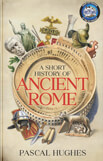Noiser
5 Things You Didn't Know About Alexander the Great
Play Short History Of... Alexander the Great
In the 2,000 years since his death, Alexander the Great has become a legendary figure.
From his love of philosophy to his favourite pet, here a five facts that reveal the man behind the myth.

Even though he died over 2,000 years ago, Alexander the Great (336-323 BC) remains one of the most famous figures in history. Known for his incredible military prowess, he built one of the greatest empires the world has ever known—expanding his relatively small kingdom in Greece all the way to northwestern India in just 11 years. His achievements were so astounding that many of his subjects began to view him as a living god. In reality, though, Alexander was just a man whose life was far more complex than the legend that surrounds him. Here are five lesser-known facts about Alexander the Great that uncover the real person behind the myth.
1. He Was Tutored by Aristotle

Alexander the Great began his military training almost as soon as he could walk, participating daily in archery, swordplay, and horsemanship drills. However, his father, Philip II of Macedon, wanted Alexander to be a well-rounded, educated leader. So, he brought in some of the greatest minds from across Greece to tutor his young son, including none other than Aristotle. The great philosopher’s tutelage had an immense impact on Alexander’s life, inspiring a lifelong love of philosophy.
2. He Was So Sad When His Favourite Horse Died That He Named a City After It

Legend has it that at the tender age of 12, Alexander was able to tame a fierce wild stallion within just a few minutes. He named this horse Bucephalus, and from that point forward, the pair were inseparable. Bucephalus accompanied Alexander in many of his most famous battles, including his fierce conquest of the Persian Empire. Sadly, around 326 BC, Bucephalus died after being struck with a spear in what is now the Punjab region of Pakistan. Alexander was so devastated that he named a nearby city “Bucephala” in honour of his trusty steed.
3. He Respected the Cultures He Conquered

During his reign, Alexander the Great amassed the largest empire in the ancient world, extending into the eastern Mediterranean, Egypt, the Middle East, and parts of Asia. His conquests disseminated Greek culture across the known world, a process known as Hellenisation. However, this does not mean that Alexander sought to obliterate or fundamentally change the cultures he conquered. Instead, he encouraged blending local and Greek customs, fostering a rich cultural exchange that ultimately led to advancements in art, philosophy, and science. Alexander’s process of cultural integration fostered loyalty among his new subjects and was one of the keys to his empire’s success.
4. His Cause of Death Remains a Mystery

In June 323 BC, 32-year-old Alexander the Great had big plans. He wanted to conquer Arabia and possibly head north to England and Ireland. But his plans were cut short when he suddenly fell ill and, after battling a fever for several days, died. To this day, no one knows exactly what caused the young king’s death. Theories range from malaria, typhoid, alcohol poisoning, and even assassination. Curiously, it was reported by the Greek historian Plutarch that during the six days before his burial, Alexander’s body showed no signs of decomposition. In 2018, Dr Katherine Hall, a lecturer at the Dunedin School of Medicine in New Zealand, proposed that Alexander may have had Guillain-Barré syndrome, an autoimmune disorder that results in acute muscle paralysis. This means that he might have actually been alive, but his breathing was so shallow and his heart rate so faint that physicians mistook him for dead. If this is true, then Alexander the Great may indeed have been murdered accidentally during the embalming process. Let’s hope it was just a bad case of Malaria.
5. His Military Strategies Are Studied to This Day
Undoubtedly, Alexander the Great is one of the greatest military minds the world has ever known. A master at combined arms tactics, he seamlessly integrated ground infantry, cavalry, and archers into one formidable fighting force. Highly adaptable, he was known for exploiting local terrains to his advantage and catching his enemy off guard when he knew he was outnumbered. His strategies were so effective that they are still studied in military academies around the world, and military leaders continue to draw inspiration from Alexander’s pioneering techniques, over 2,000 years after his death.
Listen to the Short History Of... podcast for the full story and many more like it.
